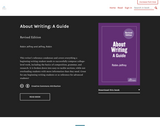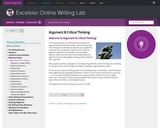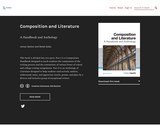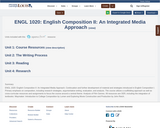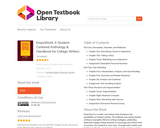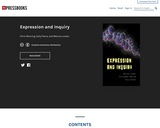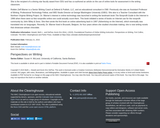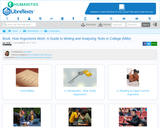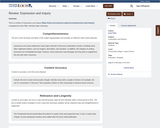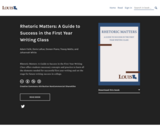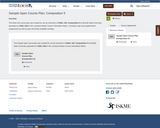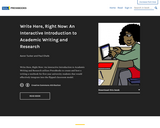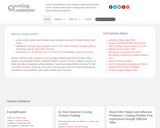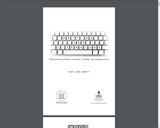This book is divided into two parts. Part I is a Composition Handbook designed to teach students the components of the writing process and the conventions of various forms of school and college writing assignments. Part II is an Anthology of Literature designed to help students read actively, analyze, understand, enjoy, and appreciate stories, poems, and plays by a diverse and inclusive group of exceptional writers.
TABLE OF CONTENT
I. The Writing Process
1. Access and Acquire Knowledge
2. Find Your Thesis
3. Make a Plan
4. Write Your First Draft
5. Revise and Edit
6. Cite Your Sources
II. Common Writing Assignments
7. The Narrative Essay
8. The Examples Essay
9. The Extended Definition Essay
10. The Process (“How to”) Essay
11. The Cause/Effect Essay
12. The Compare/Contrast Essay
13. The Argument Essay
14. Further Reading
III. Poetry
15. “I Wandered Lonely as a Cloud” by William Wordsworth (Regular Verse)
16. “Birches” by Robert Frost (Blank Verse)
17. “The Negro Speaks of Rivers” by Langston Hughes (Free Verse)
18. “How Do I Love Thee?” by Elizabeth Barrett Browning (Sonnet)
19. “The Cremation of Sam McGee” by Robert Service (Ballad)
20. “Ode to a Nightingale” by John Keats (Ode)
21. “My Last Duchess” by Robert Browning (Dramatic Monologue)
22. “One Art” by Elizabeth Bishop (Villanelle)
23. “To an Athlete Dying Young” by A.E. Housman (Elegy)
24. “Eastern Guard Tower” by Etheridge Knight (Haiku)
25. An Anthology of Poems for Further Study
IV. Short Stories
26. Nathaniel Hawthorne (1804–1864)
27. Edgar Allan Poe (1809–1849)
28. Kate Chopin (1850–1904)
29. Charles G.D. Roberts (1860–1943)
30. E. Pauline Johnson (Tekahionwake) (1861–1913)
31. O. Henry (1862–1910)
32. Edith Wharton (1862–1937)
33. Hector Hugh Munro (Saki) (1870–1916)
34. Stephen Crane (1871–1900)
35. Willa Cather (1873–1947)
36. James Joyce (1882–1941)
37. D. H. Lawrence (1885-1930)
38. Ring Lardner (1885–1933)
39. Katherine Mansfield (1888–1923)
40. William Faulkner (1897–1962)
41. Ernest Hemingway (1899–1961)
42. Eudora Alice Welty (1909–2001)
43. Roald Dahl (1916–1990)
44. Flannery O’Connor (1925–1964)
45. Fay Weldon (1931–)
46. Beryl Bainbridge (1932–2010)
47. William Dempsey Valgardson (1939–)
48. Alice Walker (1944–)
49. Leslie Marmon Silko (1948–)
50. Andrea Levy (1956–2019)
V. The Novella
51. Turn of the Screw by Henry James (1843-1916)
52. The Awakening by Kate Chopin (1850–1904)
VI. The Novel
53. The Great Gatsby by F. Scott Fitzgerald (1896–1940)
VII. Drama
54. Twelfth Night: Act 1
55. Twelfth Night: Act 2
56. Twelfth Night: Act 3
57. Twelfth Night: Act 4
58. Twelfth Night: Act 5
59. Twelfth Night: Study Guide
60. Hamlet: Act 1
61. Hamlet: Act 2
62. Hamlet: Act 3
63. Hamlet: Act 4
64. Hamlet: Act 5
65. Hamlet: Study Guide
66. The Importance of Being Earnest by Oscar Wilde (1854-1900)
67. The Importance of Being Earnest: Study Guide
68. Major Barbara by Bernard Shaw (1856-1950)
69. Major Barbara: Study Guide
Appendix A: Glossary of English Rhetoric, Grammar, and Usage
Appendix B: Glossary of Literary Terms
Appendix C: Writing an Analysis of a Poem, Story, or Play
Appendix D: Brave New World Casebook
Appendix E: The Turn of the Screw Casebook
Appendix F: Exercises and Tutorials on Grammar and MLA/APA Documentation
About the Authors
List of Links by Chapter for Print Users
